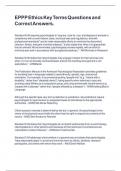EPPP Ethics Key Terms Questions and
Correct Answers.
Standard 8.09 requires psychologists to "acquire, care for, use, and dispose of animals in
compliance with current federal, state, and local laws and regulations, and with
professional standards" and to make reasonable efforts to minimize the discomfort,
infection, illness, and pain of animal subjects." It also states that, when it is appropriate
that an animals' life be terminated, psychologists proceed rapidly, with an effort to
minimize pain and in accordance with accepted procedures." - ANSAnimals in Research
Standard 6.05 states that "psychologists may engage in barter for their services only
when (1) it is not clinically contraindicated, and (2) the resulting arrangement is not
exploitative." - ANSBarter
The Publication Manual of the American Psychological Association provides guidelines
for avoiding bias in language related to race/ethnicity, gender, age, and sexual
orientation. For example, it recommends putting "people first" (e.g. "clients with a
disability," rather than "disabled clients"); being specific when referring to race and
avoiding using Whites as a comparison group; and using emotionally neutral terms (e.g.
"people with a disease" rather than "people afflicted by a disease"). - ANSAvoiding Bias in
Language
Although the specific laws vary from jurisdiction to jurisdiction, all jurisdictions require
psychologists to report known or suspected cases of child abuse to the appropriate
authorities. - ANSChild Abuse Reporting
Client access to records is determined by law but, in general, the psychologist is the
owner of the physical record while the client has the right to inspect the contents of the
record. - ANSClient Access to Records
Standard 5.05 states that "psychologists do not solicit testimonials from current therapy
clients/patients or other persons who because of their particular circumstances are
vulnerable to undue influence." - ANSClient Testimonials
Standard 3.04 addresses client welfare in a general way and states that psychologists
"take reasonable steps" to avoid and minimize harm to clients, students, research
participants, and others with whom they work. - ANSClient Welfare
, Standard 10.04 states that
in deciding whether to offer or provide services to those already receiving mental health
services to those already receiving mental health services elsewhere, psychologists
carefully consider the treatment issues and the potential client's/patient's welfare.
Psychologists discuss these issues with the client/patient...and proceed with caution." -
ANSClient Receiving Services from Another Professional
Standard 6.04 states that "if the recipient of services does not pay for services as agreed,
and if psychologists intend o use collection agencies or legal measures to collect the fees,
psychologists first inform the person that such measure will be taken and provide that
person an opportunity to make prompt payment." - ANSCollection Agencies
Standard 2.01 requires psychologists to "provide services, teach, and conduct research
with populations and in areas only within the boundaries of their competence, based on
their education, training, supervised experience, consultation, study, or professional
experience." - ANSCompetence
Laws related to competence to stand trial were derived from the standard set forth in
Dusky v. United States (1960), which defines a defendant as incompetent if, as the result
of mental defect or illness, the defendant lacks "sufficient present ability to consult with his
lawyer with a reasonable degree of rational understanding, and...a rational as well as a
factual understanding of the proceedings against him." - ANSCompetence to Stand Trial
Standard 1.08 states that "psychologists do not deny persons employment,
advancements, admissions to academic or other programs, tenure, or promotion, based
solely upon their having made or their being the subject of an ethics complaints. This does
not preclude taking action based upon the outcome of such proceedings or considering
other appropriate information." - ANSComplainants and Respondents
Confidentiality refers to the obligation of psychologists to protect clients from unauthorized
disclosure of information revealed in the context of the professional relationship.
Confidentiality is an ethical principle and, in some situations, a legal requirement. -
ANSConfidentiality
Standard 4.06 states that "when consulting with colleagues, (1) psychologists do not
disclose confidential information that reasonably could lead to the identification of a client,
research participant, or other person or organization with whom they have a confidential
relationship unless they have obtained the prior consent of the person or organization or




